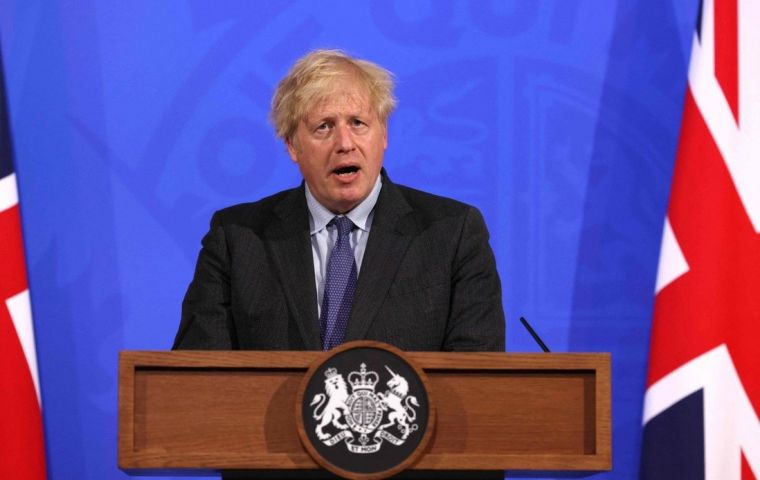MercoPress. South Atlantic News Agency
UK will not return to normal life on 21 June as announced
 Johnson took this decision in an attempt to avoid a “wave of new hospitalisations”.
Johnson took this decision in an attempt to avoid a “wave of new hospitalisations”. British Prime Minister Boris Johnson announced on Monday that he will not be able to keep his promise to return to life as it was before the coronavirus pandemic by 21 June and the UK will now have to wait until 19 July.
Johnson said the country would remain at phase 3 in a bid to avoid a “wave of new hospitalisations” and that all restrictions, including social distancing and the wearing of masks, must remain in place. He added that the new variants and the risk of a “surge in hospitalisations” led to this decision, despite some relaxation from 21 June for weddings, residences and wakes.
The 30-person limit for weddings and wakes will be removed in England from next Monday, meaning there will be no numerical limit either indoors or outdoors. No changes have been made to allow large events to take place across the board without social distancing, although some pilot schemes could be introduced. Johnson also announced a review of these measures on 28 June and a spokesman confirmed that if the data is “much better than expected”, the restrictions could be eased on Monday 5 July.
The same source added that “the effectiveness of the vaccine, especially after two doses, means that thousands of more deaths can be prevented if more people are inoculated” and “as the health chief said, at some point, we will have to live with this virus as we do with flu. But when we have effective vaccines and a variant that needs two doses for maximum protection, the right thing to do is to allow more time to save lives” and prevent an avalanche of hospital cases as severe as the first wave last April.
Modelling by the Scientific Panel on Pandemic Influenza (SPI-M), a subgroup of SAGE shows that hospitalisations would reach around the peak of the first wave if containment were reduced. The government has now been advised that the Delta (India) variant is 40-80% more transmissible than the Alpha (Kent) strain, much more than previously thought. Nationally there are about 8,000 new cases per day, the highest since February, as cases are growing at 70% week by week and in about a third of the country, they are doubling every week. Hospitalisations are increasing by 15% week on week and by 66% in the North West.
The government has officially delayed its target of offering the first dose of vaccine to people over 18 in England by 31 July. It now aims to offer all adults a first dose of the vaccine by 19 July, while all over-40s eligible for their second dose should have completed their treatment by the same date, so they will now be offered their second injection eight weeks after the first week rather than at 12 weeks as at present.
The 30-person limit for weddings will be removed in England from 21 June, despite step four being delayed, the prime minister announced. That means there will be no numerical limit on either receptions or ceremonies, indoors or outdoors. Instead, the capacity limits will be the largest number of people that venues can accommodate while remaining secure under anti-covid protocols. This is the approach already adopted for funerals. The 30 person limit will also be raised at outdoor weddings on private grounds, including gardens. There will be a risk assessment for organisers to complete.
But other restrictions on weddings, including a ban on most singing and dancing, and guests having to wear masks at certain points, will remain in place until step four is advanced.
Indoor venues may seat no more than six people per table and must close their dance floors, except for the “first waltz”. Marquees on private grounds must have two open sides to qualify as “open-air”.
The six-seat indoor rule still applies to weddings in private homes, except for deathbed weddings, which may have up to 30 guests.
The 30-person limit at other memorial events, including wakes, will be removed in England from 21 June. Instead, capacity will be adjusted to the maximum number of people a venue can hold within covid safety parameters. This means that wakes will follow the same capacity rules as funerals and weddings.
Rules on visits outside nursing homes will be relaxed in England from 21 June, despite a delay in other areas. The spokesman said: “The requirement for residents to isolate themselves for 14 days after visits outside nursing homes will also be removed in most cases.” It has not yet been confirmed which cases will continue to require 14-day isolation. However, officials indicated that nursing home residents will not need to be isolated at all after out-of-home visits, apart from possibly hospital visits. It is not yet known whether this will allow residents to spend the night with relatives.
Meanwhile, there are no changes to indoor hospitality rules, and no changes to allow large events to be held generally without social distancing, although the government is considering pilots in theatres and similar venues.
The advice to work from home, where possible, will continue to apply after 21 June, due to the delay in step four. And laws on masks in shops and on public transport remain in place, although there are no plans to reintroduce masks in schools, local authorities retain the ability to change their approach in areas where there are significant outbreaks.
The government's announcement to delay step four will require a debate in the House of Commons to be held on Wednesday 16 June.




Top Comments
Disclaimer & comment rulesCommenting for this story is now closed.
If you have a Facebook account, become a fan and comment on our Facebook Page!